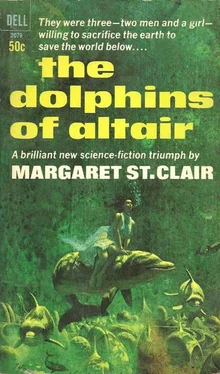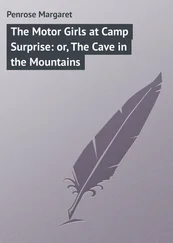Ivry was after her like a flash, and I followed him. We bore her up strongly, my back under her legs, and got he r to the surface quickly. All the same, she was gasping and weak when she clambered on Ivry’s back again, and vomited salt water for a while. If the sea had been rougher, we knew we could never have saved her.
“This won’t do,” Sven said, looking at the girl. “Night’s coming on, and we’re bound to doze occasionally. We’d better try to tie our legs together under the dolphins’ bellies.”
“What can we use for ropes?” Moonlight answered faintly.
“The straps from the canteens,” Sven replied. “They’re fairly strong, and if it keeps raining we’re not going to have any lack of fresh water. We’ll empty one canteen and throw it away, and I’ll take the strap off the other and stash the canteen away in my jacket with the food. That will give us two straps.”
Moonlight nodded. She drank from the canteen she was carrying, and then passed it over to Sven. He finished the water in it, took the strap off, and tossed the empty canteen into the sea. Then he took the strap from the second canteen, and put the canteen in his jacket.
Now began a complicated maneuver. For a Split to tie his feet together under the belly of a full-grown dolphin, and with a rather short strap, is no simple thing. Once Madelaine dropped her strap, and I had to dive for it. But they managed it at last, with a good deal of bending and twisting, and I went under to check the soundness of their knots and pull them as tight as I could with my rudimentary hand. Whether Sven and Madelaine would be safe through the night depended on how strong the leather of the straps was.
The sun sank. The moon was already up in the eastern sky. It gave a certain lurid glow, but it was only occasionally visible through the wind-driven clouds. We kept swimming northwest steadily.
The night wore on. It was a long night. Ivry said that Madelaine was shivering with cold, but when the clouds would part for a moment, we saw that she was smiling. Once she bent over and caressed his cheek. “Dear Ivry—and Amtor, of course, and the others—I’m glad you called me to you at Drake’s Bay,” she said. “I’ve been happy with you sea people. However much longer my life may be, it’s something I’ll never regret.”
Her words had been muffled by the driving rain, but Ivry got their sense clearly enough. “We’re glad too, Sosa,” he said.
Two or three hours after that, when the moon had begun to sink in the west, The Wave came at us unexpectedly. Even now I dislike thinking about it. I had been having a dolphin nap as I swam, and I woke only an instant before the wave slammed into me. It turned me end over end for I don’t know how many times, and for the first time in my life, I was afraid of drowning. It was a behemoth of a wave.
The others were more fortunate. They saw the wave moving on them like a mountain, and they dived under it—though not, as Pettrus said, without “worrying a little” about the safety of the two Splits. But the leather straps held, and when they surfaced, everybody was still there, except me. I was about a quarter of a mile behind, still being whirled about by that abominable wave. It was full of wreckage. It must have represented half the volume of the water in the North Polar ice cap.
Eventually I got some of my wits back, and dived through it. The others had missed me and were beginning to be anxious. When I came swimming up, battered and breathing hard, they were so glad to see me it almost made the wave seem worthwhile. Not quite, though. It had been too big a wave for that.
From then on, the sea slowly improved. It kept on raining, but the wind was less strong. The sun rose, pale in the clouds that scudded across it. We were still swimming northwest.
As the air grew warmer, Sven and Madelaine roused themselves to eat and drink. They were sagging with fatigue. Djuna and I went fishing and had very good luck. The change in the salinity of the water and the disturbance of the ocean currents apparently had thoroughly confused the salmon. Djuna and I satisfied our first sharp hunger, took ample fish back to Pettrus and Ivry, and then caught more for ourselves. We felt much better after our meal.
“Maddy,” Sven said about midday, “do you think the water is getting warmer?” He sounded a little hoarse.
Moonlight had been bent over, rubbing her legs with her hands to help circulation. “Yes, I’d noticed it,” she said, straightening.
“Will it keep on—“he said, and stopped. There was no need to complete the sentence. The prospect was a disconcerting one.
“I don’t think so,” the girl answered. “The quartz crystals in the ahln devices are conduits for the power, of course. But they are eroded and finally used up by conducting it. When the crystals are consumed, the production of heat will stop. The water won’t keep heating up indefinitely.”
So at least we didn’t have that to worry about. The day passed. In late afternoon Djuna called my attention to something odd in the sea a mile or so to the east. We leaped up out of the water, for a better view, and saw a surface current, thirty or forty feet broad, running in great loops like a river and sharply marked out by the freight it bore.
We swam closer. The ocean river—it must once have been the California current, but it was running very differently now—was alive with sharks, and no wonder. Among the floating timbers, sides of houses, sheets of plastic and uprooted trees were many bodies of Splits. The sharks slashed and tore at the fresh dead, greedily delighted, and when one body was stripped as clean of flesh as its clothing would allow, there was always another body to take its place at the sharks’ feast. There was no danger for us or our passengers—the sharks were too absorbed in their gluttonous enjoyment.
We swam back to the others. We did not tell Sven or Sosa what we had seen. There was no use in distressing them. But Ivry and Pettrus knew, of course.
In late afternoon we all saw a ship, a dot on the horizon, with lifeboats around it. Nobody said anything. There was nothing we could do.
We dolphins had begun to swim more slowly—we were far enough out at sea so that additional distance from shore would do us no good, and we weren’t swimming with any definite goal. But we had to keep swimming, of course. To have stopped would have left us with (no way with which to meet the force of the waves.
It kept on raining. It was still raining at sunset and it rained most of the night. The sea was somewhat calmer than it had been, and there were no more big waves, but we were all much more tired than we had been on the night before. Our relative lack of buoyancy in the fresher water weighed on us constantly. It was strange for us sea people, in our own element, to be so heavy and slow.
Morning came at last. It was still raining. The two Splits had not said anything for hours. Now Sven addressed me. “Amtor, do you know where we are?” He was so hoarse that I could hardly understand him. His voice was almost a croak.
“More or less,” I said after a minute. “I saw the navigational stars once during the night. Why?”
“Because we’ve got to rest. We’re all exhausted. Maddy and I have been sitting in the same position for thirty-six hours now, and you sea people are worn out, too. I can tell from the way Pettrus swims.
“Is there any place you can put us ashore for a while? We’ve got to rest.”
“We’re a long way from a real shore,” I said. “But there used to be a rock not too far from here. It goes straight up from deep water, so the currents around it oughtn’t to be dangerous even now. We might be able to put you ashore there.”
“Good. Let’s try it,” he croaked. “How far is it?”
Читать дальше












